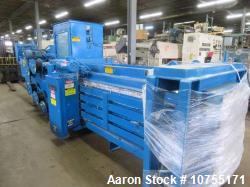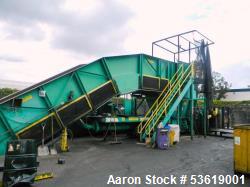Used Balers
Aaron Equipment has an inventory of reconditioned, unused, and used balers. Aaron's baler inventory consists of compactors, hydraulic, and vertical balers. An industrial baler is a machine used in various industries to compress, compact, and bundle materials into dense, manageable shapes (usually bales) for easier handling, transportation, or recycling. Balers are essential in waste management, recycling, and manufacturing operations, where efficiency in material handling is crucial. Types of balers include vertical balers, horizontal balers, closed-door balers, two-ram balers, auto-tie balers, and specialized balers for textiles, metal or plastic. Industrial balers are vital tools for businesses aiming to optimize their material handling, reduce waste, and promote sustainable practices. If you are looking to sell your used baler submit a request online or contact Erik Eichert at 630-238-7480.
Industrial balers are essential machines in waste management and recycling processes. They compress various materials, such as cardboard, plastics, metals, and more, into compact bales, making them easier to handle, transport, and recycle. This guide will explore the different types of industrial balers, their uses, and how they can benefit your business. Whether you are new to the concept or looking to upgrade your current system, this guide aims to provide you with the necessary insights to make an informed decision.
What Are Industrial Balers?
Industrial balers compress materials into dense, manageable bundles or bales. These machines are commonly used in industries that produce large volumes of waste or recyclable materials. By compressing waste, balers help reduce the volume of materials, cutting down on storage space and transportation costs.
Key Functions of Industrial Balers
- Waste Compaction: Balers compact waste materials, reducing their size and making them easier to store and transport.
- Material Sorting: Some balers are equipped with features that assist in sorting different materials, enhancing the recycling process.
- Cost Efficiency: By compacting waste, businesses save on disposal costs and improve their recycling efforts.
Types of Industrial Balers
Industrial balers come in various forms, each designed to handle specific materials and volumes. Here are the most common types:
- Vertical Balers: Vertical balers are compact machines that are suitable for smaller operations. They take up less space and are ideal for facilities where floor space is limited. These balers are typically used for compacting cardboard, paper, and plastics.
- Pros: Cost-effective, space-saving, and easy to operate.
- Cons: Limited capacity, not suitable for heavy-duty materials.
- Horizontal Balers: Horizontal balers are larger and more robust, designed for high-volume operations. They efficiently handle various materials, including cardboard, plastics, and metals.
- Pros: High capacity, suitable for continuous operation.
- Cons: It requires more space and a higher initial investment.
- Auto-Tie Balers: Auto-tie balers automate the tying process, enhancing efficiency and reducing labor costs. These machines are ideal for facilities with high throughput needs and are commonly used in recycling centers.
- Pros: Automated process, high efficiency, reduced labor.
- Cons: Higher maintenance means a more complex setup.
- Metal Balers: Metal balers are specialized machines for compacting metal waste, such as aluminum, steel, and copper. These balers are critical in industries that deal with metal scrap, helping to manage and recycle metal waste effectively.
- Pros: Specialized for metal, durable construction.
- Cons: Limited to metal materials, higher cost.
Benefits of Using Industrial Balers
Implementing industrial balers in your waste management system offers numerous advantages:
- Space Saving: By compacting waste materials into dense bales, businesses can significantly reduce the space required for waste storage. This is particularly beneficial for companies with limited storage facilities.
- Cost Reduction: Compacted bales are easier and cheaper to transport, reducing the overall cost associated with waste disposal. Additionally, recycling companies often offer rebates for sorted and compacted materials.
- Improved Efficiency: Balers streamline waste management processes, reducing the time and labor required to handle waste. This allows employees to focus on more productive tasks.
- Environmental Impact: Balers contribute to environmental sustainability by facilitating recycling and reducing waste volume. They also help businesses reduce their carbon footprint and comply with environmental regulations.
Choosing the Right Baler for Your Business
Selecting the appropriate baler depends on several factors, including the type and volume of materials you handle, available space, and budget constraints. Here are some considerations to help you make the right choice:
- Material Type: Identify the primary materials you need to bale. For instance, a vertical baler might suffice if you mainly handle cardboard and paper. However, a horizontal or metal baler would be more appropriate for metals or high-volume operations.
- Volume and Throughput: Consider the amount of waste your business generates. High-volume operations may require more robust machines, such as horizontal or auto-tie balers, to keep up with demand.
- Space Availability: Evaluate the space available in your facility. Vertical balers are better for smaller spaces, while horizontal balers require more room.
- Budget: Balers come in a range of prices. It's essential to balance cost with the features and capacity you need. While auto-tie balers offer automation and efficiency, they also have a higher price tag.
Maintenance and Safety Tips
Proper maintenance is crucial to ensure your baler operates efficiently and safely. Here are some tips to keep in mind:
- Regular Inspections: Regularly inspect your baler for signs of wear and tear. Addressing issues promptly can prevent more significant problems.
- Employee Training: Ensure that employees operating the baler are adequately trained. Understanding the machine's functions and safety features is essential to prevent accidents and maintain efficiency.
- Scheduled Maintenance: Implement a scheduled maintenance program to keep your baler in top condition. This includes lubrication, part replacement, and system checks.
Top Baler Brands
While there are many reputable manufacturers, the market has shown a preference for the following brands:
- Maren Balers & Shredders, Excel Baler LLC, SSI Shredding Systems, Inc., American Baler Company, International Baler Corporation, and many more!
Industrial balers are vital tools in waste management and recycling efforts. By understanding the different types of balers and their benefits, you can make an informed decision that aligns with your business needs. Whether you want to improve efficiency, reduce costs, or enhance your environmental impact, selecting the right baler can make a significant difference.
Invest in the appropriate baler and take a proactive approach to waste management. Transform your business operations and contribute to a more sustainable future. With the right knowledge and tools, you'll be well-equipped to handle your waste management challenges effectively. Remember, the key to success is choosing the right equipment, maintaining it, and training your team to use it effectively. Investing in an industrial baler will pay off through increased efficiency, cost savings, and a positive environmental impact.

